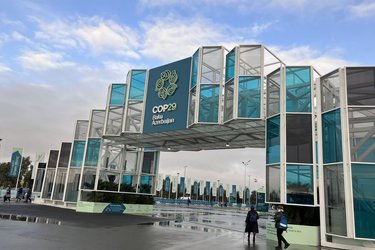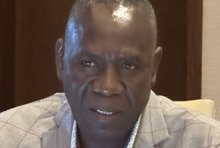
It’s taken two years to get established but the LIFE-AR programme is ready to roll out in Uganda. Commissioner Joseph Epitu shares the lessons and challenges of getting to this point.
Joseph Epitu (JE) is in the Ministry of Water and Environment in the government of Uganda and has been instrumental in setting up the Least Developed Countries (LDC) Initiative for Effective Adaptation and Resilience (LIFE-AR) in the country.
In early May he travelled to the 18th International Conference on Community-Based Adaptation to Climate Change (CBA18) in Tanzania, where he highlighted the work to fellow participants, sharing what he had learned from the implementation.

Q: Why was it important for you to showcase LIFE-AR during the CBA conference?
JE: We’ve just moved from the ‘establishment’ phase of the LIFE-AR programme in Uganda to the ‘test and evolve’ phase. Over the last two years we’ve laid the foundations of the programme: we’ve set up governance structures, done baseline studies and a situational analysis to inform how we take forward the devolved climate finance mechanism with communities.
We’ve put together a monitoring, evaluation and learning framework and a communications strategy, selected two pilot districts and launched the programme nationally. We went through a period of learning with all those things.
We’ve engaged with stakeholder institutions and being LIFE-AR that means the whole of society – the water and environment ministry, gender ministry, local government, finance and national planning; academia, the Ugandan Management Institute and civil society, represented by Environmental Alert.
The CBA18 conference, with the major theme of local solutions inspiring global action, provided a perfect opportunity to share the lessons and experiences of implementing the locally led adaptation (LLA) approaches through the LIFE-AR programme in Uganda, and get ideas and feedback about whether we are on the right track.
Q: What lessons or success stories from the implementation of LIFE-AR in Uganda do you think are relevant for CBA participants?
JE: One of the stories we can talk about is the importance of using a whole-of-society approach when implementing programmes. It looked complex and hard to manage when we started but once we brought the team together, we realised that there was a wealth of knowledge to drive the process.
I’ve been coordinating the programme and now I can sit back and the team from different departments can take over. They can market the programme in their departments and agencies. For example, we can bring on board our partners in local government and because they are known – it’s their constituency – they can help to move forward the programme with their colleagues.
And when we want something from the Ministry of Finance, we can use our contacts who are part of the implementation structures of the programme.
However, a key lesson to share with other frontrunner countries is that when you bring in partners from a range of institutions, the selection of the right individuals and transparency and accountability at the secretariat level are key. For example, when the budget for the programme is known to everyone, it becomes easier to manage the process.
Q: How do you think the LIFE-AR 'business unusual' approach will benefit climate change adaptation in communities?
JE: In my view, the unique selling point of business unusual is the involvement of communities in identifying and assessing their vulnerabilities and participating in deciding priority investments. Then participating in the procurement of service providers, contract management and, ultimately, deciding what will lead to sustainability.
Secondly, under the devolved climate finance mechanism – still a new model in Uganda – the LIFE-AR programme should be sending money direct to communities and not through intermediaries. Whatever resources we send will be based on their workplans and budgets at that level. Then they will have direct knowledge about what is going on.
Another unique aspect is that the district government will know what is going on. The money will go to the parish, which is supervised by the district council.
Then the other thing is that 70% of any finance must go to communities for actual investment. The fact that we plan to make the budget transparent, even the communities will know what is going to them in advance. That will strengthen confidence in the programme and they will feel their participation is recognised.
Q: What is the communities’ perception of LIFE-AR and how did they react to the business-unusual approach and the idea of devolved climate finance mechanisms?
JE: It does seem like a different approach to them. We conducted a capacity needs assessment with communities and they expressed their appreciation. They are being involved in determining their own destiny.
Even the district is appreciative. We had a training session for trainers last month. We brought representatives from the first four pilot districts and we could see that they were excited about the approach. They are happy with the 30% target for operational costs.
Q: What will be the biggest challenges for Uganda in implementing LIFE-AR?
JE: The biggest challenge we have is managing expectations. It has taken two years preparing to roll out the programme to the districts. Government partners are putting us under pressure to see results on the ground. We’ve been setting up guidelines and structures, and attention to detail is vital. We’ve excited the communities – they’ve also been waiting for two years.
We’ve allocated a certain amount of money per parish and we’ve selected three parishes per district. We anticipate a challenge that communities may identify some investments that need more than that amount.
Another challenge is that it takes time to move from business-as-usual to business unusual. It involves attitude change, thinking outside the box and flexibility.
And finally, business unusual, while mostly positive, involves people from across society who may have different perspectives. We will have to try to harmonise them and bring them together.
Q: What are you most proud of in implementing LIFE-AR so far?
JE: I’m proud of being very particular in selecting the team members. I went behind the scenes to lobby with institutions on who should be part of the team – and they are definitely up to the task. They appreciate the programme and can talk confidently about it – I can now sit back.
They have one vision even though they are from different organisations. And we are hoping to achieve the same with local governments. Once we can do that, then we will have done 50% of the capacity building that we were planning. They will be self-motivated and will feel part of the programme – and perhaps not ask so many questions!
Q: More generally, what was it that moved the Ugandan government to get involved in LIFE-AR and what do you expect to achieve with this initiative?
JE: I’ve been part of the process from day one. The Ministry of Water and Environment is not afraid to test the waters, so when new ideas like LIFE-AR come, we welcome them. We test them against existing processes. I think that is what informed the move to business unusual.
But I must credit our technical and political leadership. Ministers have been very receptive, including the permanent secretary - he has been very supportive. He has internalised the programme, always follows up on what is going on and gives us support.
At district level, we are being careful. We are trying to use champions to roll out the programme. For instance, three political leaders from three pilot districts went on a trip to Kenya in May 2023. They were so impressed, they have come back and are champions among their political colleagues.
That’s a game changer. When people hear programme principles being advanced by one of their colleagues from another district, it is easier to accept that this programme will transform our society.
This article was originally published by IIED - https://www.iied.org/interview-key-moment-life-ar-ready-roll-out-uganda